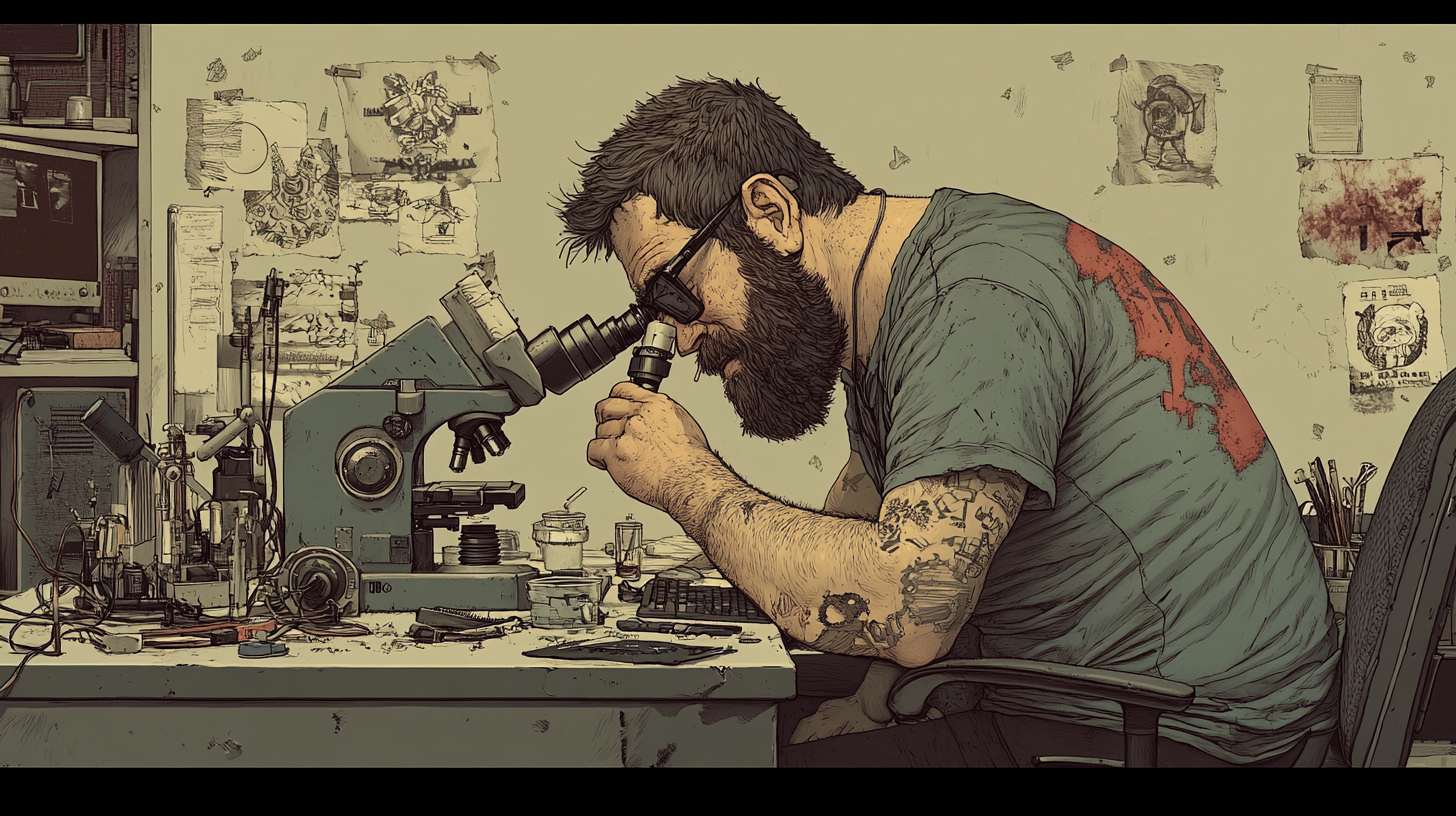1) What If There Was Never a “Big Problem” to Solve?
We wake up and immediately step into the ring: mind buzzing, heart on guard, to-do list like a referee with a whistle. There’s the Problem of Life looming over everything—money, meaning, safety, love—so we retreat into our head, trying to reason our way into peace. Alan Watts whispers a scandalous idea: what if that “big problem” is a ghost? What if, beneath the noise, nothing is actually wrong with life at all?
That pitch raises eyebrows, especially among people who build for a living. If you’re a creator or coach, you’ve been rewarded for solving problems. But the mind can quietly shift from solving to inventing—spinning stories about mysterious inner forces, future catastrophes, lurking deficiencies. Think long enough and you conjure a shapeless villain. “I must fix everything first.” And peace gets postponed another year.
Watts invites a smaller, holier task: describe what is actually happening. Drop the speculation, just for a moment. See what remains. You may find despair dissolves into something simpler: a breath, a body, a single conversation to have, a small thing to make today.
2) From “Stuff” to Pattern
From far away a galaxy looks like a blob, a lump of “stuff.” Look closer and you see it’s not a lump—it’s pattern. Your business, your art, your relationships: same. From far away, “a mess.” Look closely enough, and it becomes a dance of rhythms—attention and rest, giving and receiving, learning and forgetting, showing up and stepping back.
When you stop treating your life as a giant slab of trouble and start noticing how it actually moves, something soft happens. You stop hating yourself for being tired and realise you’re simply out of daylight. You stop bashing your “willpower” and see you’re just hungry. You stop telling apocalyptic stories about your calling and notice you’re avoiding one conversation. Pattern returns you to proportion. Proportion returns you to mercy.
3) You Are Not Separate From the World You Serve
Our culture loves the lone hero: conquering market forces, bending fate, “crushing it.” Meanwhile, Alan Watts smiled at the obvious: nothing exists alone. A buyer can’t buy without a seller; a teacher can’t teach without a learner; a leader can’t lead without the willingness of the led. Even your breath relies on trees you will never meet.
When you forget this, you become brittle—fighting what you secretly need. When you remember it, a gentler ethic emerges: I am in conversation with everything. My work is part of a field. I am not against my audience; I am with them. Not above my family; among them. Not battling reality; participating in it.
That shift—from domination to participation—is spiritual, not tactical. It’s how you stop treating clients like objects, and start seeing souls. It’s how you write copy that doesn’t manipulate. It’s how you remain generous without draining yourself dry. You become a living transaction: a place where giving and receiving meet without keeping score.
4) The Performance Contract (and Why You’re Tired)
Most of modern life runs on an unspoken deal: I’ll validate your story if you validate mine. Let’s keep it light. Let’s not rock anything. Let’s pretend certainty. Smile for the algorithm. Nod through the meeting. Perform normal.
Waking up breaks that contract. Not angrily—just honestly. You can still be kind, still be warm, but you stop borrowing truth from the room. Yes, this can create distance. But the distance isn’t punishment. It’s space—for sincerity, for craft, for love that doesn’t depend on masks. If some bonds loosen, others will quietly deepen. The person who can sit with you in the unperformed silence—that’s your person.
The same goes for your audience. Chasing applause raises numbers and lowers temperature. Speaking from the centre lowers noise and raises trust. Warmth without performance is a rare medicine; people feel the difference, even if they can’t name it.
5) The Mercy of Description
When your mind spirals, try this small act of devotion:
-
Name the feeling in one word.
-
Name one fact you can verify.
-
Name one honest next step—tiny, human, doable.
That’s it. No heroics. No fixing your entire life by tea time. Just description, then a humane step. You’ll feel your nervous system exhale. Your life becomes less of a math problem and more of a garden. Gardens are not solved; they are tended.
6) Solitude That Doesn’t Rot Into Loneliness
Solitude is not lack; it’s room. Room for the things that make you strong: attention, prayer, affection, reading, craft, care for the body, long walks that don’t arrive anywhere in particular. Loneliness is an ache against yourself. Solitude is a homecoming.
The world will tell you to fill every silence with something clever, profitable, persuasive. Resist. Let a little empty space survive your calendar each day—unclaimed, unmonetised, unoptimised. Watch what returns: a sentence that rings true, a decision you were avoiding, the memory of why you started.
If you fear solitude will make you cold, practice the simplest sacrament: notice one beautiful thing and whisper thank you. The heart can’t starve while it’s blessing.
7) How to Work Without Warring Against Yourself
Here is a gentle way to move through your creative day:
-
Arrive
Touch your breath. Feel your weight on the chair or the ground. You are here; you don’t have to earn it. -
Choose one mercy
One real thing that would love to exist by dusk. Not perfect—alive. A page, a message, a call, a small repair. -
Begin with a sentence you believe
Not what you think you should say. Not what will impress. One line that tells the truth. Breathe. Write the next. -
Stop before you’re empty
Leave a little energy in the tank for the person you love, for a walk, for the night sky. -
Close with gratitude
Name one thing your work gave you today—clarity, patience, a better question. Receive it.
Call that a productivity system if you want. It’s really a way of keeping your soul in the room while you work.
8) Boundaries as Blessings
Boundaries are not walls around your heart; they are irrigation ditches. They make sure water reaches the roots that matter.
-
With family: “I love you. Let’s keep certain topics gentle unless we both feel spacious enough to go deeper.”
-
With clients: “Here’s how I work best: steady pace, honest communication, humane deadlines.”
-
With yourself: “I’ll tell the truth more often than I try to be liked.”
If someone insists that your worth requires the collapse of your boundaries, that is not love—it’s a misunderstanding you’re no longer obligated to nourish.
9) When Thinking Becomes a Cage
Overthinking is a great servant, poor master. It’s a mind trying to keep you safe by simulating every possible future. Thank it for its devotion. Then give it a gentle job: “List three good first lines.” “Outline two kind ways to say no.” “Find one question I’m avoiding.” Minds relax when they are useful.
When you can’t stop spinning, move your body. Walk. Stretch. Do ten slow breaths. Change sensory channels—touch cold water, look at a far horizon, smell something clean. You’re an organism, not just a head on a stick. Peace often arrives through the doorway of the body.
10) Service Without Sacrifice
You don’t need to bleed to prove you care. Let your work serve without shrinking you. Make things that reduce confusion. Write things that return people to their own strength. Teach without dependency. Invite without pressure. When you must sell, sell like a neighbour: clear, fair, modest, confident.
The secret satisfaction of service is how much it returns you to yourself. The ego wants applause; the soul wants to be useful. Useful is quieter—and more durable. You can build a life on it.
11) The Courage to Be Ordinary
The internet trains us to measure every effort by its virality. But the soul keeps a different ledger. It notices the morning you chose silence instead of doom-scrolling, the afternoon you wrote to one person who needed it, the evening you washed the dishes like prayer. It adds up in a way analytics never will.
“Ordinary” is the right size for love. Ordinary is how a tree becomes a forest.
12) Ten Small Practices for a Softer, Truer Life
-
Begin the day before turning on your phone. One page, one stretch, one glass of water.
-
Name things out loud. “I’m anxious.” “I’m hungry.” “I’m okay.” Truth relaxes the body.
-
Walk with no destination at least twice a week. Let boredom ripen into wonder.
-
Speak one kind sentence to a stranger. Gentle presence is civilization.
-
Stop mid-scroll and place your hand on your heart. Ask, “What would help right now?”
-
Make something you won’t post. Give it privacy; let it be yours.
-
Bless your tools before work: “May this help me help.”
-
Eat a quiet meal. No screen. Taste returns you to earth.
-
Name three gratitudes at dusk. They can be tiny. Tiny is the right size.
-
Go to bed before you’re finished. Perfection is a thief. Tomorrow is generous.
13) When You Love People Who Don’t Understand Your Path
Someone you adore may never agree with your view of the world. This doesn’t mean love has failed. It means love must grow wider than agreement.
Hold to these three:
-
Respect: Speak without sneering. Refuse contempt even in your head.
-
Restraint: Not every truth needs to be delivered hot. Let timing be its own wisdom.
-
Remembering: Recall a shared meal, a good joke, the ways you were carried when you couldn’t stand. Honour your history even as you change.
You are allowed to choose peace over a point.
14) Surrender Without Collapsing
“Surrender” isn’t giving up; it’s giving back the job that was never yours—managing the universe. Keep your small vows: kindness, daily bread, steady craft, honest speech. Let the rest turn like the planets turn. Grace is not something you earn; it’s something you notice when you stop trying to own the sky.
A Blessing for Overthinkers Who Still Want to Build
May your mind be bright but not brittle.
May your work be useful more often than it is admired.
May your boundaries be irrigation, not fences.
May your solitude be a hearth, not a cell.
May you remember that love is the only measure that holds at closing time.
And when the old ghost returns with its endless problem,
may you smile, name what is true in front of you,
and do the next small, human thing—
the kind that makes a day feel lived.






